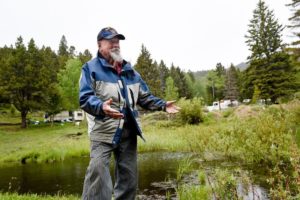Ralph Waldo Emerson’s famous essay on self-reliance is often quoted to explain away inconsistent policies, or inconsistent law enforcement. “A foolish consistency is the hobgoblin of little minds,” Emerson wrote. “With consistency, a great soul has simply nothing to do.”
Today’s politicians have plenty to do. Advocates of the Emerson view follow his advice – to speak clearly what they think today, but just as clearly tomorrow, even if it contradicts everything they said today. If that confuses people, Emerson simply rationalized, “To be great is to be misunderstood.”
That kind of greatness didn’t make much sense to Joe Robertson, a Montana man who became the victim of law enforcement which was not only inconsistent, but mean-spirited.
 Mr. Robertson, in his late 70s, still operated a business that supplied water trucks to Montana firefighters, and he was well liked by neighbors and Jefferson County officials. With the national forest crisis worsening, in 2013 and 2014, he dug a series of small ponds to store water in case of fire. The ponds were near a small (one foot-wide, one foot-deep) ditch that carried “the equivalent of two to three garden hoses of water flow,” according to court documents.
Mr. Robertson, in his late 70s, still operated a business that supplied water trucks to Montana firefighters, and he was well liked by neighbors and Jefferson County officials. With the national forest crisis worsening, in 2013 and 2014, he dug a series of small ponds to store water in case of fire. The ponds were near a small (one foot-wide, one foot-deep) ditch that carried “the equivalent of two to three garden hoses of water flow,” according to court documents.
There are court documents, because the U.S. government decided Mr. Robertson was breaking the law. They claimed the ditch was a vitally important “channel,” protected by the Clean Water Act as navigable “Waters of the U.S.” His activity required a permit, which he lacked. He didn’t ask for a permit because he could not have imagined anyone could consider the ditch to be “navigable.” He said he wasn’t breaking the law, because digging the ponds could not possibly discharge any soil or pollution into “navigable waters.” It is 40 miles to the closest actual flowing stream.
The EPA and the Corps of Engineers had a field day prosecuting Mr. Robertson, though both agencies have dug similar ponds. In fact, the Corps was responsible for decades of dredging and channelization projects that destroyed habitat across the country – actions that now require untold millions in “restoration” work funded by the taxpayers. But the Corps claimed Mr. Robertson’s work – done to help prevent environmentally devastating wildfires – polluted critically important waters, and restoration would cost hundreds of thousands of dollars. Consistency, though, would be the hobgoblin of little minds.
Court cases interpreting the government’s jurisdiction under the Clean Water Act have been equally inconsistent from the beginning, leaving EPA mostly in charge of interpreting its own jurisdiction. The Obama EPA proposed new rules, defining “Waters of the U.S.” (WOTUS) as essentially all water everywhere, which was never Congress’ intent. When the Clean Water Act was passed 47 years ago, EPA was tasked with setting regulations to end pollution of the “waters of the United States.” Congress didn’t presume to control all water in the country (most of which was and is regulated by states), so the law was applied to “navigable waterways” that served “interstate commerce.” The Obama WOTUS rule essentially declared virtually all water to fit that definition, including water that is clearly not navigable, or commerce-supporting. The Trump EPA withdrew the WOTUS rule, but some enforcement actions were already underway.
The inconsistency applied in Mr. Robertson’s case was just plain sad. A federal court convicted him, and at the age of 78 he was sentenced to 18 months in prison and $130,000 in restitution, to be withheld from his Social Security checks. The 9th Circuit Court of Appeals, predictably, upheld the conviction and he went to prison. He served the entire sentence, and was released with his reputation ruined, his finances a wreck, and still facing 20 months’ probation – as if he were a serious threat to the public safety.
With help from the Pacific Legal Foundation, Mr. Robertson appealed to the U.S. Supreme Court. In a landmark ruling that sent shock waves through the government, the high court reversed the ruling, and forced the 9th Circuit – three years late – to vacate his conviction, and return what money he had already paid. The court chided the government for inconsistent interpretation of “navigable waters.” Is it a ditch, a stream, or a navigable river? It cannot be one thing when it suits the EPA’s purposes, and something else when it doesn’t.
Justice came a little late for Mr. Robertson. He died at the age of 80, not knowing the highest court in the land would ultimately vindicate him. But in doing so, the court struck a blow for consistent enforcement, a victory for the hobgoblin of little minds.
This column appeared in the Grand Junction Daily Sentinel August 23, 2019.




Comments on this entry are closed.